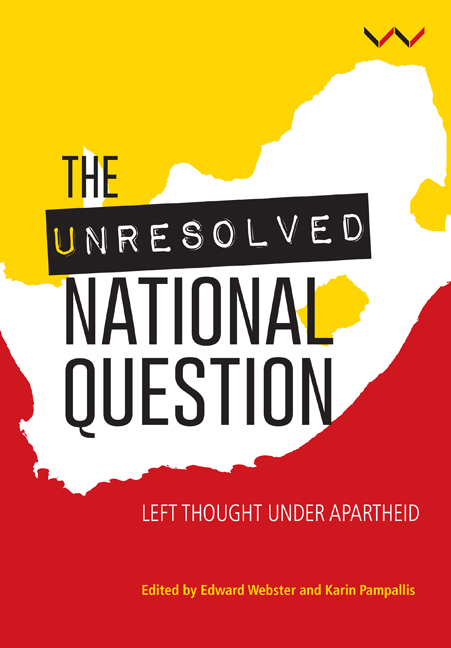Book contents
- Frontmatter
- Contents
- Acronyms and Abbreviations
- Preface: Edward Webster and Karin Pampallis
- Introduction: Revisiting the National Question
- PART ONE KEY FOUNDATIONAL TRADITIONS
- Chapter 1 Decentring the Question of Race: Critical Reflections on Colonialism of a Special Type
- Chapter 2 The African National Congress: Social Democratic Thinking and the Good Society, 1940–1962
- Chapter 3 Oliver Tambo and the National Question
- Chapter 4 The Unity Movement and the National Question
- Chapter 5 The Africanist Turn in South African National Question Discourses
- PART TWO CONTINUITY AND RUPTURE
- Biographical Notes
- Index
Chapter 4 - The Unity Movement and the National Question
from PART ONE - KEY FOUNDATIONAL TRADITIONS
Published online by Cambridge University Press: 21 April 2018
- Frontmatter
- Contents
- Acronyms and Abbreviations
- Preface: Edward Webster and Karin Pampallis
- Introduction: Revisiting the National Question
- PART ONE KEY FOUNDATIONAL TRADITIONS
- Chapter 1 Decentring the Question of Race: Critical Reflections on Colonialism of a Special Type
- Chapter 2 The African National Congress: Social Democratic Thinking and the Good Society, 1940–1962
- Chapter 3 Oliver Tambo and the National Question
- Chapter 4 The Unity Movement and the National Question
- Chapter 5 The Africanist Turn in South African National Question Discourses
- PART TWO CONTINUITY AND RUPTURE
- Biographical Notes
- Index
Summary
INTRODUCTION
Capital accumulation in South Africa started off as a process of ‘accumulation by dispossession’ (Harvey, 2010: 48–49). War, violence, predation, thievery, criminality, fraud … these were the means by which the indigenous people were dispossessed of their communal lands, and by which the basis to wealth in this country passed into the hands of the capitalists.
South Africa was incorporated into the world economy as an enclave – as a colonial economy established by imperialist class interests primarily for the exploitation of its raw material resources (Mhone, 2001). Our economy was typically characterised by a capital-intensive sector co-existing with a capital-starved traditional economy. Although often described as ‘dual’, they are by no means ‘separate’. The capitalist sector, particularly the gold mining industry, was critically dependent on the traditional economy for the ongoing supply of ‘ultra-cheap, ultra-exploitable’ supplies of labour (Johnstone, 1976). By providing a subsistence base, the traditional economy in effect lowered the minimal acceptable wage threshold of labour (Wallerstein, 2003), thereby ensuring the very existence and sustainability of the capitalist system in this country.
Herein lies the root of our so-called National Question for, historically, class rule in South Africa has been about institutionalising ‘systems of duality’ in our society in order to extend and maintain the conditions of exploitation. It is against this background that divide and rule as a fundamental mechanism of class rule needs to be understood.
Capitalism's interests were served by dividing the nation, by perpetuating a core-periphery duality in society and the economy.
Historically, this has created the conditions of struggle in South Africa. It explains why opposition that was predicated on the principle of ‘one single South African nation’ has had revolutionary implications – why a call for a non-racial democracy was a fundamental threat to the very basis of capital accumulation.
- Type
- Chapter
- Information
- The Unresolved National Question in South AfricaLeft Thought Under Apartheid, pp. 77 - 95Publisher: Wits University PressPrint publication year: 2017



